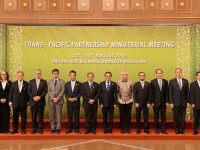The initial Canadian press coverage on the conclusion of the Trans Pacific Partnership negotiations has unsurprisingly focused on the dairy sector, with word that the government plans to effectively create a milk tax by transferring billions of dollars to dairy farmers without any evidence of loss. Lost in the coverage are the copyright and privacy implications of the deal. From a copyright perspective, it is notable that the Canadian government has sought to downplay the TPP, releasing a summary that suggests that it is consistent with current law. The government’s description of the copyright provisions in the TPP state:

Fair Dealing by Giulia Forsythe (CC BY-NC-SA 2.0) https://flic.kr/p/dRkXwP
Copyright
TPP Negotiations Conclude: What Next for the Trade Deal Without a Public Text?
The Trans Pacific Partnership negotiations concluded early this morning in Atlanta with the 12 countries reaching agreement on the remaining outstanding issues. The U.S. quickly posted a summary of the TPP and the Canadian government has followed with its own package on the deal. At a just-concluded ministerial press conference, the ministers noted that this is one step in a longer process. The text itself must still be finalized and then each country will have its own rules before signing onto it. In the U.S., there is a review period with the full text, so this will be a 2016 issue. In Canada, new treaties must be tabled for review in the House of Commons, so there will be a Parliamentary review.
With the election only two weeks away, that means that there will be no text to review before the national vote. Instead, Canadians will face a barrage of TPP claims:
The TPP End Game and the Canadian Election
Negotiations aimed at concluding the Trans Pacific Partnership are underway in Atlanta with plenty of signs that the various countries are prepared to compromise in order to reach a deal when the ministers (including Canadian International Trade Minister Ed Fast) arrive toward the end of the week. Canada has already caved on most intellectual property issues (copyright term, etc.) and Prime Minister Harper recently signaled Canada’s willingness to cave on the issues related to the auto sector and the dairy industry. Meanwhile, Japan is said to be ready to compromise on rice and there is a proposal on biologics that may not change much, but could be enough to garner support from some Asian countries.
While I think there remain questions about whether a caretaker government can/should be committing to such significant changes (the New Zealand Minister of Trade noted that Canada is negotiating as if there is no election underway), the TPP is clearly viewed as a major political prize by the Conservatives in the midst of an election campaign. The usual suspects (Chamber of Commerce, Council of Chief Executives, etc.) presumably have their press releases and quotations of support for a done deal already submitted and even opponents in the auto sector are reportedly afraid to criticize the government.
How a Dancing Baby Struck a Blow for Balanced Copyright Law
In February 2007, Stephanie Lenz, a California mother of a pair of young toddlers, shot a short video of her children dancing in the family kitchen with the Prince song “Let’s Go Crazy” playing in the background. Lenz proceeded to upload the 29 second video to YouTube so that friends and family could see it.
Thousands of hours of user-generated video are posted online every day and there was nothing particularly remarkable about the dancing baby video. What set it apart, however, was that several months later Universal Music Group, Prince’s music label, sent a takedown notice to YouTube claiming that it infringed its copyright.
My weekly technology law column (Toronto Star version, homepage version) notes that similar takedown notices are sent to Internet intermediaries such as Google every hour. Yet this particular takedown demand seemed so at odds with the law (few experts believe it infringes copyright) that it sparked an eight year court battle in the United States and served as the inspiration for a 2012 Canadian copyright reform that protects users and websites that create and host non-commercial user-generated content.
Canadian Music Industry Hit With Competition Complaint Over Public Domain Recordings
Earlier this year, I wrote about the secret campaign by major record labels and publishers to stop the release of public domain recordings, most notably Beatles records that outsold the offerings from major label records at retail giant Wal-Mart. The campaign included extensive lobbying for an extension in the term of copyright for sound recordings. The government included the extension in the April 2015 budget, with Prime Minister Stephen Harper writing personally to the Graham Henderson of Music Canada to inform him of the change. The reforms were a gift to the recording industry, with the result that Canadian consumers now face higher prices and less choice.
Stargrove Entertainment, the company behind the public domain Beatles releases, has found that the industry is still blocking attempts to bring works in the public domain to market. As a result, this week it filed a complaint with the Canadian Competition Tribunal, claiming that major record labels such as Universal Music and Sony Music, music publishers, and CMRRA are violating Canadian competition law by refusing to deal, engaging in illegal price maintenance, and exclusive dealing. The company is seeking an order requiring the companies to provide a mechanical licence so that it can continue to produce and sell public domain records. The complaint (CT-2015-009) should be posted on the Tribunal site shortly.
The complaint tells a fascinating behind-the-scenes tale, with the recording industry doing everything in its powers – including posting false reviews and pressuring distributors – to stop the sale of competing records. The complaint notably identifies Universal Music Canada as a key player in the alleged activities, including former President Randy Lennox, who last week jumped to Bell Media.











